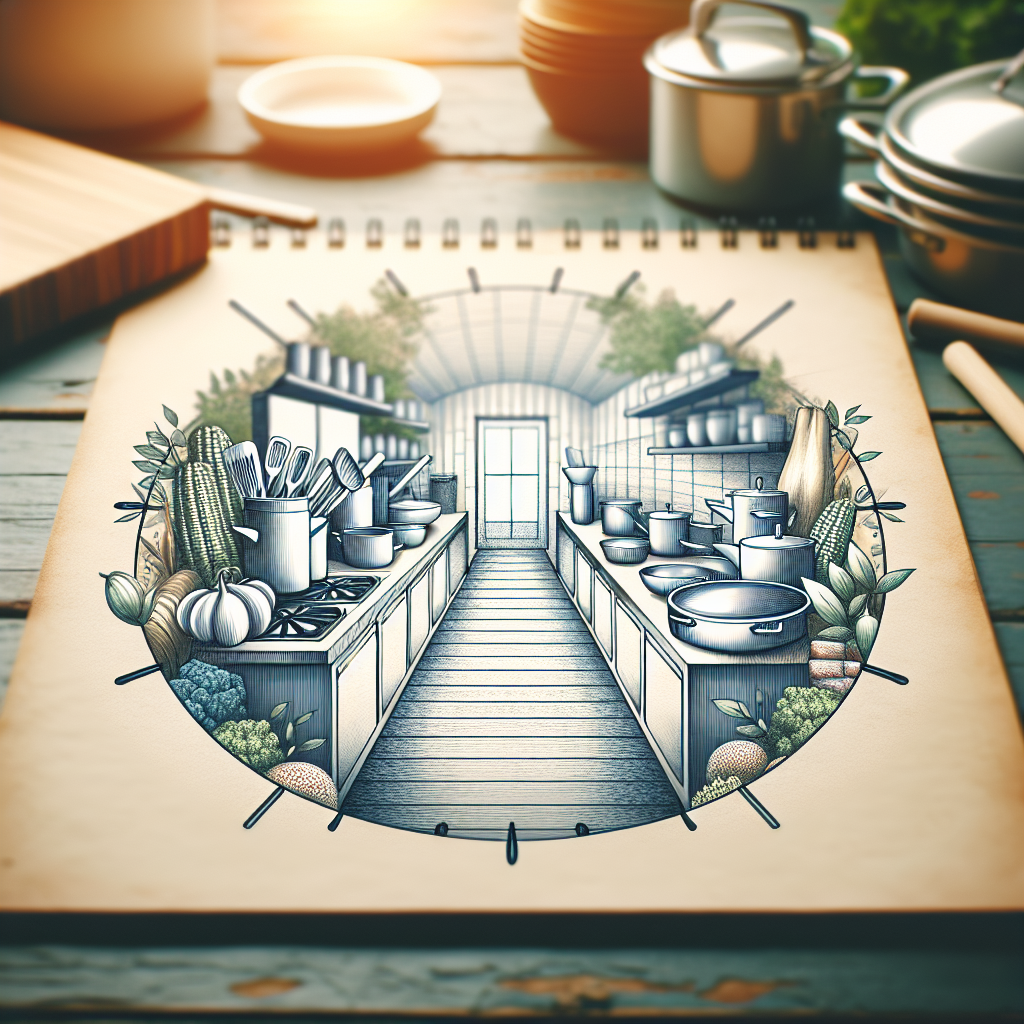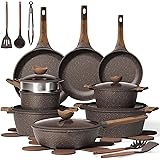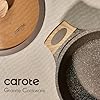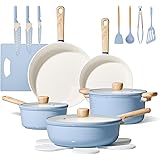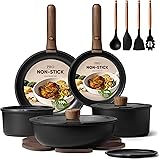Some suggestions to consider!
CAROTE 26PCS Pots and Pans Set Non Stick, Cookware Set Pots and Pans Induction Cook Ware, Nonstick Kitchen Cooking, PFOA Free
$219.99 (as of February 25, 2026 12:06 GMT +00:00 - More infoProduct prices and availability are accurate as of the date/time indicated and are subject to change. Any price and availability information displayed on [relevant Amazon Site(s), as applicable] at the time of purchase will apply to the purchase of this product.)CAROTE 24pcs Ceramic Cookware Set, Pots and Pans Non Stick Kitchen Cookware Sets, Pots and Pans Set Cooking Set with Knife Set
$59.98 (as of February 25, 2026 10:30 GMT +00:00 - More infoProduct prices and availability are accurate as of the date/time indicated and are subject to change. Any price and availability information displayed on [relevant Amazon Site(s), as applicable] at the time of purchase will apply to the purchase of this product.)CAROTE 19pcs Pots and Pans Non Stick, Cookware Sets Detachable Handle, Induction Kitchen Pots and Pans,NonStick Cooking Set, Oven/Dishwasher/Fridge Safe, Space Saving
$56.98 (as of February 25, 2026 10:30 GMT +00:00 - More infoProduct prices and availability are accurate as of the date/time indicated and are subject to change. Any price and availability information displayed on [relevant Amazon Site(s), as applicable] at the time of purchase will apply to the purchase of this product.)
Choosing the Right Cookware
Understanding Materials
When I first dove into the world of cooking, I thought that all cookware was created equal. Boy, was I wrong! The material of your pots and pans significantly impacts how your food cooks. Whether it’s stainless steel, cast iron, or non-stick, knowing the strengths and weaknesses of each material can make or break your cooking experience.
For example, stainless steel is fantastic for browning and deglazing but doesn’t conduct heat as evenly as cast iron. On the other hand, non-stick pans are lifesavers for avoiding messy cleanup, especially when it comes to eggs or pancakes. Remember, it’s not just about picking a pretty color; it’s about what’s going to work best for your cooking style.
As you choose your cookware, consider your cooking habits. Do you sauté veggies often? Go for a stainless steel sauté pan. Love to bake? A cast iron skillet could be your best friend. Tailoring your choices to your cooking needs will make you happier in the kitchen, trust me!
Size Matters
Let’s talk size! I’ve made the mistake of going all-in on a cookware set and then discovering that the pots are gigantic for my small kitchen. It’s all about balance. Think about what you cook most often. If you frequently make big batches of soup for friends, a larger pot makes sense. But if you’re like me and whip up quick weekday dinners, a set of smaller skillets will serve you well.
Additionally, consider storage space. Cookware can take up a crazy amount of room, so opt for pieces that nest or stack. Not only does this save space, but it also helps keep your kitchen organized. To this day, I still jumble through my cabinets for my favorite pan, and it’s frustrating!
In closing, don’t forget about weights. Heavier pans are great for stability, especially when searing meats, while lighter options can be easier to maneuver for everyday tasks. I can’t stress enough how finding the right size and weight can adjust your comfort and confidence in the kitchen.
Non-Stick vs. Traditional
Ah, the age-old debate: non-stick or traditional cookware? I remember the first time I cracked an omelet in a non-stick pan. It was like magic! But let’s be real, there’s something to be said about the classic appeal of stainless steel or cast iron.
Non-stick pans are perfect for beginners and anyone who wants to simplify cleaning. However, they can wear down over time, and cooking at high temperatures is a no-no since it can ruin the coating. If you go this route, invest in good quality. Trust me, it’s worth it!
On the flip side, traditional cookware develops a natural non-stick surface over time if you care for it properly. This is especially true with cast iron. I’ve spent hours seasoning my skillet, but it’s become my trusty workhorse in the kitchen. Ultimately, it’s about mixing it up and having different types to suit various cooking techniques.
Investing in Quality Cookware
Recognizing Value
So, here’s the deal: getting into cooking can feel overwhelming with the price tags on some of this cookware. However, don’t let that scare you away! Investing in quality materials makes such a difference in the long run. It’s like buying a good pair of shoes – you might spend more upfront, but they’ll last you years and serve you well.
Think about how often you cook. If you’re whipping up meals several times a week, it’s worth investing in durable pieces. Avoid the “cheap” route where you end up replacing your pans every few months. Quality cookware not only improves your cooking performance but also enhances your food’s flavor.
Plus, great cookware stands out as a long-term partner in your culinary journey. Each time you pull it out, you’ll feel a sense of pride—it’s a fantastic feeling to cook with pieces that look and feel top-notch!
Finding the Right Brands
Let’s be honest: the market is saturated with cookware brands, so how do you know which ones to trust? I’ve spent a good amount of time researching and trying various brands, and frankly, some have impressed me while others have just let me down.
Sticking to reputable brands with positive reviews can save you a lot of headaches. Look for cookware that offers quality with a warranty. This is a great indicator that the brand stands by its product. When I discovered some brands offered lifetime warranties, it felt like a light bulb moment for me!
Don’t shy away from exploring new brands, either! Sometimes, lesser-known companies deliver fantastic value. Read the reviews, ask friends or family, and even browse social media for real-life opinions. You’d be surprised how many hidden gems are out there!
Caring for Your Cookware
Okay, now that you’ve invested in some quality cookware, it’s crucial to understand how to take care of it. Some people overlook this step, thinking once they have it, they’re good to go. Nope! Just like a good plant, your cookware needs some TLC.
For non-stick pans, a gentle hand is crucial. Using metal utensils can scratch your beloved pan surfaces, so opt for wood or silicone. Even with traditional cookware, keeping it clean is vital to prevent buildup and maintain its performance. I learned this the hard way when I woke up to a burnt-on mess after a late-night cooking session!
Additionally, proper storage matters. Keeping your pans stacked safely can protect them from scratches. I like to use pot protectors or even a simple kitchen towel to cushion them. Taking a little extra time to care for your pans will ensure they last longer and keep cooking delicious meals for you!
Exploring Different Cooking Techniques
Getting Creative with Your Cookware
One of the best parts of owning great cookware is exploring different culinary techniques. With high-quality pans, I’ve found that I’m more willing to try new things. Baking, searing, sautéing… you name it, I’m game! Each piece of cookware has its specialty, and learning the best practices can truly elevate your meals.
For instance, I’ve experimented with braising meats in my Dutch oven. It’s amazing how even heat distribution can transform a tough cut into a tender masterpiece. There’s magic in slow cooking that just can’t be replicated with cheaper pans. With great cookware, I feel empowered to experiment, and it’s so rewarding!
Don’t hesitate to explore! Take a class, watch cooking shows, or even scroll through YouTube tutorials. The more you play around with your cookware, the more confident you’ll become. Plus, cooking can be a ton of fun — like an art you get to eat afterward!
Building Your Cooking Skills
Let’s face it: owning great cookware won’t automatically make you a culinary master. However, it gives you the platform to build your skills! I remember starting with simple recipes and gradually taking on more complex dishes as I became familiar with my tools.
Start with basics like chopping techniques, sauce-making, or bread-baking, then challenge yourself to more intricate meals. It’s like leveling up in a video game; each new dish gives you more confidence to tackle the next. And if you stumble? That’s part of the learning process. Trust me, I’ve had my share of culinary disasters!
Find what you love cooking the most and dive deeper into those methods. Whether it’s grilling, steaming, or frying, honing your skills can turn cooking from a chore into a passion. Be patient with yourself — growth takes time, but it’ll all be worth it when you’re serving up delicious meals!
Staying Inspired in the Kitchen
Creating a Joyful Cooking Environment
Cooking is so much more than just following recipes. It’s about creativity and exploration. I’ve found that creating an inviting cooking space keeps my spirits high. From colorful ingredients to quirky gadgets, a fun environment fuels my enthusiasm in the kitchen.
Consider playing music or podcasts while you cook, too! This can make the process feel less like a chore and more like a mini party. I love blasting my favorite tunes and dancing around while I prep dishes — it puts me in a much better mood!
Additionally, inviting friends over for a cooking night can inspire you, too. Share recipes, swap tips, and enjoy a meal together. The connection and laughter that fill the kitchen can enhance your experience and leave you with wonderful memories and delicious food!
Finding New Recipes
To keep the cooking journey exciting, I often hunt for new recipes. Thanks to social media, the options are limitless! I love following food bloggers, checking out cooking shows, and browsing platforms like Pinterest and Instagram for delicious recipe inspiration.
Don’t shy away from trying new cuisines or techniques! Step out of your comfort zone and explore global flavors — it opens up a whole new realm of experiences. The more adventurous I get with my cooking, the more fun I have, and it keeps my family guessing what’s for dinner!
Simply jot down recipes that catch your eye and plan a themed dinner night. Maybe Mediterranean one night, followed by Asian the next. Cooking doesn’t have to be monotonous; mixing things up can make it one of the most rewarding activities in your life!
Joining Cooking Communities
All in all, joining cooking communities can be incredibly inspiring! Whether online or in-person, connecting with fellow foodies can elevate your skills and passion for cooking. I’ve found that sharing experiences and tips can lead to new friendships and countless cooking hacks.
Look for local cooking classes or food events where you can meet others who share your love for cooking. Online forums and groups can also be a treasure trove of information and encouragement. Sharing successes and failures will remind you that we all start somewhere, and it’s a learning journey.
The beauty of cooking is that there’s always something new to learn. Building connections with like-minded people can turn an already enjoyable hobby into an incredible life experience. So, get out there and meet your culinary community!
Frequently Asked Questions
1. What type of cookware is best for beginners?
For beginners, I recommend starting with a good quality non-stick skillet and a versatile saucepan. These provide a great balance between ease of use and effectiveness for a variety of meals.
2. Is it worth investing in high-end cookware?
Absolutely! While high-end cookware may require a more substantial initial investment, it typically offers better durability, performance, and even cooking results, ultimately saving you money in the long run.
3. How should I care for my cookware to ensure it lasts?
Caring for your cookware can vary by type, but generally, it involves regular cleaning and avoiding harsh abrasives. For cast iron, remember to season it often. For non-stick, use wooden or silicone utensils to prevent scratching.
4. Are there specific cooking techniques I should master first?
Starting with the basics like sautéing, boiling, and baking can set a solid foundation. These techniques will enable you to tackle a wide range of recipes as you progress in your cooking journey.
5. How can I stay inspired to cook more often?
Creating a joyful cooking environment, discovering new recipes, and connecting with cooking communities can help you stay inspired. The more you infuse fun and creativity into your cooking routine, the more motivated you’ll be to whip up meals!
